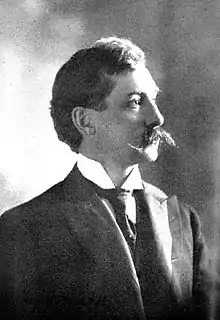Fenimore Chatterton
Fenimore Chatterton (July 21, 1860 – May 9, 1958) was an American businessman, politician, and lawyer. He was the sixth Governor of Wyoming from April 28, 1903 until January 2, 1905.
Fenimore Chatterton | |
|---|---|
 | |
| 6th Governor of Wyoming | |
| In office April 28, 1903 – January 2, 1905 | |
| Preceded by | DeForest Richards |
| Succeeded by | Bryant Butler Brooks |
| 3rd Secretary of State of Wyoming | |
| In office January 2, 1899 – January 7, 1907 | |
| Governor | DeForest Richards Himself Bryan Butler Brooks |
| Preceded by | Charles W. Burdick |
| Succeeded by | William Schnitger |
| Member of the Wyoming State Legislature | |
| In office 1890-1893 | |
| Personal details | |
| Born | July 21, 1860 Oswego County, New York |
| Died | May 9, 1958 (aged 97) |
| Political party | Republican |
| Spouse(s) | Stella Wyland Chatterton |
| Alma mater | George Washington University University of Michigan |
Biography
Chatterton was born in Oswego County, New York, but raised in Washington, D.C.. He attended the George Washington University, then Millersville State Normal School in Lancaster, Pennsylvania. In 1878, he moved to Sheridan, in Wyoming Territory, and set up as a businessman. He received a law degree from the University of Michigan in 1892. Chaterton married Stella Wyland Chatterton.
Career
In 1888, he began his political career by successfully running for treasurer and probate judge of Carbon County. He served time in two classes of the Wyoming State Legislature from 1890 until 1893. He was the Wyoming Republican state chair from 1893 to 1894.[1]
In 1898, he was elected Secretary of State, but his tenure was interrupted by the death of Governor DeForest Richards in 1903, thrusting him into the position of governor. Chatterdon served as governor from April 28, 1903 to January 2, 1905.[2] It was during Chatterton's time as Governor that the hanging of Tom Horn occurred; it has been speculated that Chatterton's failure to win re-election as governor in 1905 was the result of his refusal to commute Horn's death sentence. Chatterdon was not nominated by his party to fill the office of governor for the 1904 election, but continued to serve as Secretary of State until his term expired in 1907.
After his term as Secretary of State expired, Chatterton did not serve in public office again. He set up a private law practice, from which he retired in 1932.
Death and legacy
Chatterton died on May 9, 1958, and is interred at Lakeview Cemetery in Cheyenne, Wyoming. He was an Episcopalian and a member of the Knights Templar Masonic Order.
Chatterdon has been credited as the first to announce the Wyoming (song) as the official state song, during the Industrial Convention in 1903. The song was later endorsed as the official song by the state press association, state industrial convention and the state university.[3][4]
References
- "Chatterton, Fenimore (1860-1958)". The Political Graveyard. Retrieved October 30, 2012.
- "Wyoming Governor Fenimore Chatterton". National Governors Association. Retrieved October 30, 2012.
- "Grand Encampment Herald" (PDF). Grand Encampment Herald. Oct 26, 1903. Archived from the original (PDF) on 7 March 2014. Retrieved 31 October 2012.
- "Wyoming's State Song" (PDF). Wyoming Library Roundup. Archived from the original (PDF) on March 7, 2014. Retrieved October 30, 2012.
External links
| Wikimedia Commons has media related to Fenimore Chatterton. |
- Works by or about Fenimore Chatterton at Internet Archive
- from the National Governors Association
- State biography from the Wyoming State Archives
- Biographical summary from the Political Graveyard
- North Platte River from Wyoming Tales and Trails
- Fenimore Chatterton at Find a Grave
- Roster of State Officers from the Wyoming Secretary of State website
- Wyoming Roundup
- State of Wyoming Website
| Political offices | ||
|---|---|---|
| Preceded by Charles W. Burdick |
Secretary of State of Wyoming 1899-1907 |
Succeeded by William Schnitger |
| Preceded by DeForest Richards |
Governor of Wyoming April 28, 1903 – January 2, 1905 |
Succeeded by Bryant B. Brooks |
